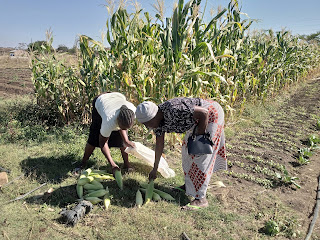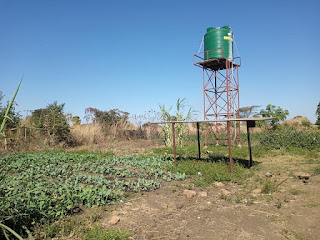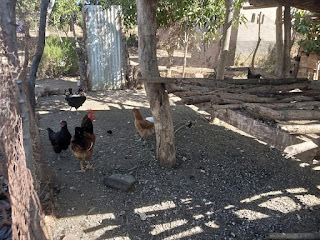 |
| Shepherdess Mulomba on duty |
It is four years since we lost Pastor Obert Mulonga who was a District Pastor in the Seventh-Day Adventist Church (SDA).
Pastor Mulomba served in the now defunct Central Zambia Conference and later in Lusaka Conference of the SDA Church as a District Pastor.
He died in the year 2019 when he was serving as District Pastor for Makeni Villa Mission District, leaving behind his wife Beene and children.
At the time of his death, Pastor Mulomba had secured a 3 hectares farm in Kasalu Village of Mumbwa District in Central Province were he sunk a borehole, bought solar panels and ensured farming activities would start.
Since his demise, his wife, Shepherdess Mulomba took on the mantle and transformed the farm into a successful mixed farming project.
For the sake of non-Adventsists, a Shepherdess is a term we use to address the wife of a Pastor in the SDA church.
Yesterday I visited my mother Mrs Phyllis Monde Shalala at our farm at Lubanze Village, which is a neighbouring village to the Shepherdess’ village.
Due to old age, Mum has not been well in the past week and I decided to drive to the farm to check on her.
 |
| Mum buying maize from the Shepherdess |
An hour after I arrived, she asked me to escort her to her friend ‘who sales fresh maize’ and I didn’t know which friend she meant.
We arrived at the said farm and guess who, it was Shepherdess Mulomba.
Impact Of Solar Energy on the Farm:
The whole farm is well partitioned into portions for maize, tomatoes, cabbages, paw paws, bananas and a chicken run.
She has utilized the abundant sunlight in Mumbwa to power the whole farm using solar energy.
Two huge solar panels have been mounted on the farm and they provide the necessary power for lighting and pumping water to all the crops.
“My husband left these solar panels when he died and with the help of my son, we mounted them and also put up this water tank to start watering our crops,” said Shepherdess Mulomba in an impromptu interview.
The 5,000 liters tank is raised five meters high above the ground and with the help of a pump and solar power, its supplies water to all the portions were crops are planted.
A huge network of plastic pipes has been installed to deliver water to all corners of the farm.
 |
| Solar panels and the tank supplying water |
Through the solar-powered pump, drip irrigation delivers water bit by but to crops and they are watered in droplets.
Yesterday when mum and I visited the farm, we found Shepherdess Mulomba harvesting winter maize on a one acre portion.
On the next portion, another two acres of winter maize is at knee level and using drip irrigation, the crops look healthy and growing fast.
“With the help of solar, drip irrigation is helping us a lot. We no longer need to carry buckets to water the crops, we just switch on the button and the water flows to the crops, she said.”
Market For Crops:
With this successful business, I asked Shepherdess Mulomba how beneficial this business is and how she manages to cope with the market.
Despite having a light truck which she can use to supply the crops to Lusaka and other markets, Shepherdess Mulomba says she sales all her produce at the farm.
“When the crops are ready for the market, traders come here as early as 05:00hrs in the morning and they line up to buy. Tomatoes, maize, cabbages and even chickens sale so fast that within days, my stock is finished,” she said.
 |
| Tomatoes under drip irrigation |
Other Farm Products:
Paw Paws which were planted last year are now two meters high and according to Shepherdess Mulomba, by the end of the year they will start producing flowers and the harvest will be done next year.
She says paw paws are also a good fruit as very few people in Mumbwa plant them on a large scale.
She also has a chicken run which at the time of the visit had about 25 birds, all village chickens.
The chickens are enclosed in a wire fence and they have facilities for feeding and hatching.
“We recently sold the village chickens and many people bought,” said Shepherdess Mulomba.
At the edge of the farm in a huge pit which was dug when houses were being built at the farm.
That pit, if well utilized, the Shepherdess can use it for fish farming, that would be another revenue earner for her.
Conclusion:
The moral of this story is that being a widow should not be the end of one’s life.
 |
| Village Chickens |
Shepherdess Mulomba has shown what a widow can do if they continue the legacy of their late husband.
Her investment at the farm is inspirational and she has continued to sponsor her children at university using proceeds from the mixed farm.
Her shining example can be emulated by other women who need financial independence.
You do not need a lot of money or a huge piece of land to make money.
All you need is just a small a piece of land, abundant sunlight and your dedication to the business, then you can make it.